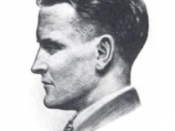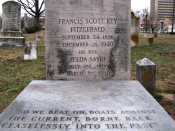"High society" - the upper class has always been viewed by those in and around it as a place of false appearances and sugar coated deceptions. F. Scott Fitzgerald's "The Great Gatsby" supports and illustrates this notion. The focus of "The Great Gatsby" is North Eastern wealth, specifically, that of Tom and Daisy Buchanan. A passage describing the Buchanan's friend Jordan Baker's drunken state is a perfect symbol for their own situation: "... Miss Baker's lips fluttered, she nodded at me almost imperceptibly." (13). Much like Miss Baker's own faux composure, Tom and Daisy struggle to maintain an image of peace and harmony.
Tom is trapped between two worlds - that of his "family life in East Egg, and that of his (not so) "secret life" in New York City. At his magnificent home in Long Island, Tom's marriage is already past the point of failure. Relations with his wife are beyond strained, as is evident in the cool formality with which they interact, and the occasional lapses in this facçade which reveal the strife: " 'Did you give Nick a little hear-to-heart talk on the verandah?' demanded Tom suddenly...
'Don't believe everything you hear.' " (24). On the mainland, Tom's life his "other woman," Myrtle Wilson, is not {stable} either: "Making a short deft movement Tom Buchanan broker her nose with his open hand." (41). The exact graveness of the situation is indicated by the escalation of Tom and Myrtle's private problems to public (albeit drunken) violence. Tom is in the middle of two disastrous relationships with women, and as a result, has fallen into an equally tempestuous relationship within himself. Nick notices this after his initial dinner visit - "Something was making him nibble at the edge of stale ideas as if his sturdy physical egoism no...


